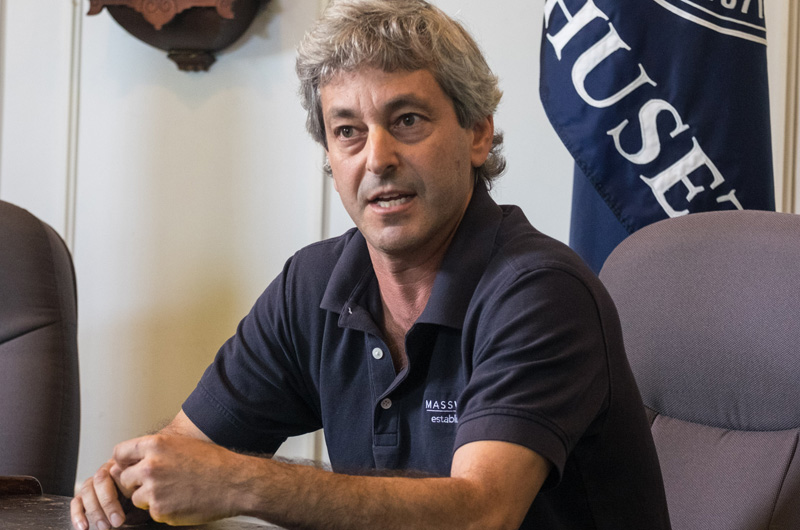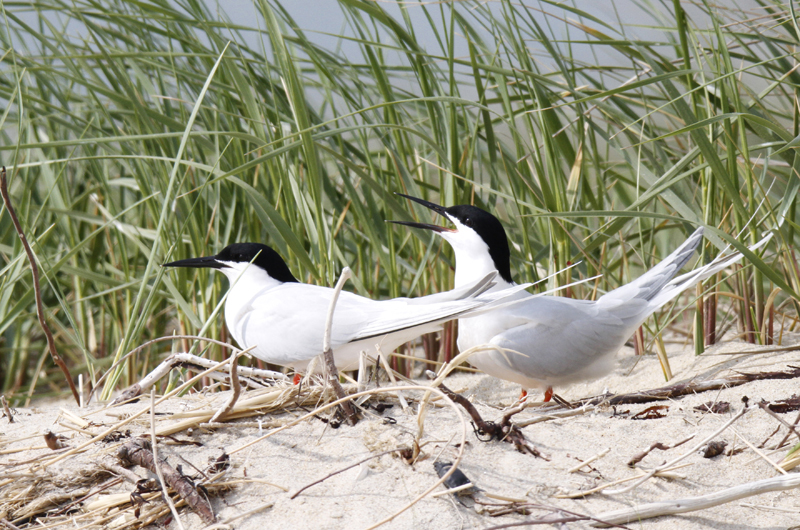After a summer of tension over beach closures to vehicles to protect nesting shorebirds, Vineyard fishermen said this week that new measures designed to increase vehicle access did little to ease their concerns.
“There are storm clouds on the horizon, I don’t have to tell you that,” said Cooper Gilkes 3rd, longtime owner of Coop’s Bait and Tackle, at a meeting Wednesday called to discuss shorebird regulations. “People have waited 17 years [for beaches to reopen]. I remember the first meeting I attended and they told us maybe three years. That was 17 years ago.
“How much is that bird worth? Period. From Maine to Florida,” he added.
The meeting was called by The Trustees of Reservations, which owns or manages most of the beaches on Chappaquiddick, including at Cape Pogue, Wasque and Norton Point. All are popular spots for fishing and recreational beachgoers. State and federal officials who attended the meeting outlined recovery goals for shorebird species that raise their young on barrier beaches, including American oystercatchers, terns and piping plovers.
Under state and federal law, many barrier beaches are closed to vehicles to protect nesting shorebirds. The closures take place from roughly late May into July, depending on when the birds nest and fledge.
This year Norton Point, which connects Chappy to Edgartown along the southern end of Katama Bay, was closed to vehicles from July 1 to July 23.
“Obviously this year in particular there have been a lot of questions raised as far as the amount of beach that’s been closed,” Trustees Vineyard superintendent Chris Kennedy told about 25 people gathered at the Edgartown town hall. “We figured this would be an ideal time for us to have a discussion with all of you to talk a little bit about what are the plans for next year.”
Susi von Oettingen, an endangered species biologist with the U.S. Fish and Wildlife Service New England office, said shorebird recovery has seen mixed success so far.
Recovery goals for piping plovers include maintaining a population of 2,000 breeding pairs for five years across the entire Atlantic range, from Canada to North Carolina, and reaching a five-year average of 1.5 fledglings per pair.
New England has been more successful than other areas with 625 breeding pairs, Ms. Oettingen said. No areas have met the productivity goal for chicks.
Trustees ecology assistant Caitlin Borck said there were 17 breeding pairs of piping plovers on Trustees properties this year with 11 fledglings, a low number. Nests were lost to predators like skunks, gulls, crows and rats, overwash from storm surges and abandonment.
Over the past five years, the average number of piping plover pairs has stayed steady at 17, Ms. Borck said, though productivity has declined. The 10-year trend is slightly better.
Jonathan Regosin, chief scientist with the endangered species program at Mass Wildlife, said beach protections have made a difference and allowed species to recover, in turn allowing him to work with other agencies on a conservation habitat plan that would relax some of the rules.
“As numbers go up, it seems like [areas are] penalized for doing a good thing,” Mr. Regosin said, noting that more nesting shorebirds often means more restrictions.
“There’s a threat of losing community support for these protections,” he said. “So we take a step back and see if we can make some changes, at least at the margins.”
New options, with permits and the right conditions, include allowing people to drive past unfledged chicks. Towns or organizations like the Trustees can apply to participate in the program.
“Our goal, believe it or not, has been to simultaneously advance piping plovers and increase recreational opportunities,” Mr. Regosin said.
Permits would allow over-sand vehicles near unfledged chicks provided an escort accompanies a vehicle or a caravan, he said. There are also self-escort options.
Allowing this kind of beach activity would require a bird monitor to watch the chicks, and driving can only take place six hours a day, officials said.
The strict requirements require money and staffing. “There are real costs involved, but real benefits,” Mr. Regosin said. “I think it’s toned down some of the rhetoric around the issue.”
Mr. Kennedy said the Trustees have received three-year permits for two areas on Chappy, one near the narrows at Cape Pogue and the other at the south end of Leland Beach. The Trustees could allow escorted beach access, he said, at a cost of about $40,000 a year for additional staff, vehicles and radio equipment.
Meanwhile, he noted the vehicle restrictions have had an impact on Trustees revenue from the sale of over-sand vehicle permits. “We felt it. Our permit sales went from several thousand dollars a day to zippo, overnight,” Mr. Kennedy said. “We lost our revenue for the month of July.”
The Trustees must decide before next year whether to adopt the access-by-permit program because of the planning involved — although no can say for sure from year to year where the birds will nest or what the conditions will be.
“There’s no surefire plan here,” Mr. Kennedy said. “We can’t say with complete assurance that if we implement a certificate of inclusion, bump up your permit by $20, that would guarantee complete access.”
He continued: “The question today is how you feel, is this something you feel is worthwhile or not. This year . . . we chose a wait and see attitude, but we do have this option . . . it’s now September, we have plenty of time to implement this getting ready for next summer.”
Fishermen who attended the meeting were quick to say the plan was not enough.
Chappaquiddick resident Bob Clay said escorted cars or caravans wouldn’t work. “We have families that are coming here with four, five-year-old grandchildren,” he said. “The federal and state government has disregarded human beings as being an important part of the habitat,” he added. “People in this room could talk for hours about all the things that have gone wrong.”
His wife Fran Clay said the situation has led to “frustrated, angry people who used to live here and left, and people who don’t rent anymore because of the months that the beaches are closed. It’s really a terrible situation that comes from the top, not from all of you. It’s so impossible.”
Martha’s Vineyard Surfcasters Association president Don Scarpone said the hours the beach would be open to escorted traffic, likely between 10 a.m. to 4 p.m., were not ideal for fishermen. “That’s not going to help us,” he said.
Others questioned the success of the program as a whole.
“How much damage is the over-sand vehicle truly going to cause,” said Maine fisherman Ron McKee, who is on the Island to fish the derby. “The economic blowback from this has been increasing coastwide, year by year.”
He added: “How about making a situation that works . . . I’m in favor of conservation, but I’m not in favor of stupid conservation.”
“We’ve heard the frustrations,” said Chappaquiddick resident Woody Filley, who moderated the meeting. He said the next steps are to follow up and suggest changes that work for everybody.
Surfcaster Ron Domurat suggested a wider survey about the new program, but felt the consensus in the room was clear. “It’s not going to do us any good at all,” he said.










Comments (20)
Comments
Comment policy »